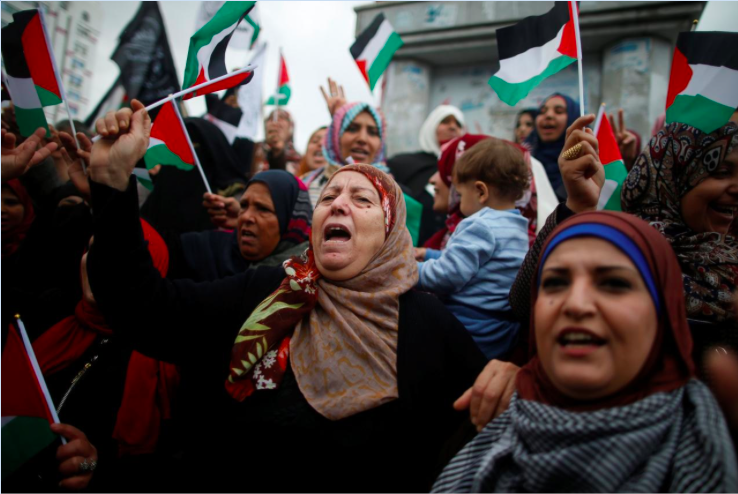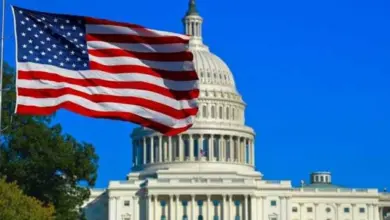
President Donald Trump is expected to announce on Wednesday that the United States recognizes Jerusalem as the capital of Israel and that it will move its embassy to the holy city.
In doing so, Trump will be breaking with longtime US policy and potentially threatening regional stability, despite warnings from Western and Arab allies.
Why is President Trump planning to recognize Jerusalem as Israel’s capital and move the embassy there?
There has long been pressure from pro-Israel politicians in the United States to move its embassy from Tel Aviv to Jerusalem, and Trump made it a signature promise of his campaign during the 2016 presidential election.
It is a decision that will likely be popular with many conservative and evangelical Christians in his political base. Many of them support political recognition of Israel’s claim to the city. Vice President Mike Pence and David Friedman, the ambassador to Israel appointed by Trump, are thought to have pushed hard for both recognition and embassy relocation.
Why does Jerusalem play such an important role in the Middle East conflict?
Religion, politics and history.
Jerusalem is a city that is sacred to three of the great monotheistic faiths: Judaism, Christianity and Islam, and each has sites of great religious significance there. It has been fought over for millennia by its inhabitants, by invading Romans, Crusaders, Ottomans and the British Empire, and by the modern states of Israel and its Arab neighbors.
Israel’s government regards Jerusalem as the eternal and indivisible capital of the country, although that is not recognized internationally.
Palestinians feel equally strongly, saying that East Jerusalem must be the capital of an eventual Palestinian state. The city even has different names. Jews call it Jerusalem, or Yerushalayim, and Arabs call it Al-Quds, which means “The Holy”.
But the city’s significance goes beyond the two parties most immediately involved.
At the heart of Jerusalem’s Old City is the hill which is known to Jews across the world as Har ha-Bayit, or Temple Mount and to Muslims internationally as al-Haram al-Sharif, or The Noble Sanctuary.
It was home to the Jewish temples of antiquity but all that remains of them above ground is a restraining wall for the foundations built by Herod the Great. Known as the Western Wall, this is a sacred place of prayer for Jews.
Within yards of the wall, and overlooking it, are two Muslim holy places, the Dome of the Rock and the Al-Aqsa Mosque, which was built in the 8th century. Muslims regard the site as the third holiest in Islam, after Mecca and Medina.
The city is also an important pilgrimage site for Christians, who revere it as the place where they believe that Jesus Christ preached, died and was resurrected.
What is the city’s status now and does any other country have an embassy in Jerusalem?
When British rule ended in 1948, Jordanian forces occupied the Old City and Arab East Jerusalem. Israel captured East Jerusalem from Jordan in the 1967 Middle East war and annexed it in a move not recognized internationally.
In 1980 the Israeli parliament passed a law declaring the “complete and united” city of Jerusalem to be the capital of Israel, but the United Nations regards East Jerusalem as occupied, and the city’s status as disputed until resolved by negotiations between Israel and the Palestinians.
Other countries have had embassies in Jerusalem in the past, but moved them out of the city some years ago. The King of Jordan retains a role in ensuring the upkeep of the Muslim holy places.
What is likely to happen next? Has Jerusalem been a flashpoint before?
Tensions are running high in Jerusalem, and violence has erupted before over matters of sovereignty and religion.
In 1969 an Australian Messianic Christian tried to burn down the Al-Aqsa Mosque. He failed, but caused damage. So charged was the Middle East’s political climate – just two years after the Six Day War – that there was fury across the Arab world.
In 2000, the Israeli politician Ariel Sharon, then opposition leader, led a group of Israeli lawmakers onto the Temple Mount/al-Haram al-Sharif complex. Palestinians protested, and there were violent clashes that quickly escalated into the second Palestinian uprising, also known as the Al-Aqsa Intifada.
Deadly confrontations also took place in July this year after Israel installed metal detectors at the entrance to the complex following the killing of two Israeli policemen there by Arab-Israeli gunmen.
In recent days, Palestinian factions have called for protests leading up to Trump’s speech, and Arab leaders across the Middle East have warned that a unilateral American move could lead to turmoil, and hamper U.S. efforts to restart long-stalled Israeli-Palestinian peace talks.




